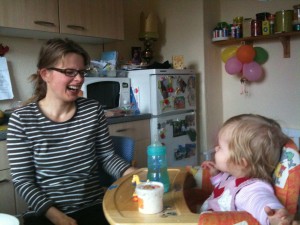Life is no less complicated in Europe, of course: people die, divorce, and occasionally find themselves imprisoned in Austrian dungeons. But the German government is making at least one part of life a little easier: parenting.
I just got back from a week in Berlin and beyond visiting friends with babies, all of whom rely, in one way or another, on the largesse of German social policy. I had been aware, of course, of the European welfare state. Every Teabagger I met in my last trip to Wasilla had lots to say about it, none of it positive or particularly well-informed.
And yet, tell me you’re not jealous: New parents get a total of 14 months of paid time off between the two of them (you get 76% of your former net salary if you had a fulltime job; the self-employed get a minimum of €300, or about $445, a month). The parents can decide themselves how to split it. My friends Martin and Manuela in lovely Raben Steinfeld are going for a traditional split: She will take 12 months off, he will take two.
There’s more:
- Mothers get a little extra financial support in the first two months after giving birth.
- Women don’t have to tell prospective employers that they’re pregnant.
- It’s virtually impossible to fire a pregnant women, for any cause.
- You can take up to three years off after your child is born, and you are guaranteed to get your job back.
About schooling: Depending on what state you live in, there’s guaranteed access to daycare and preschool. One friend was paying €200 a month for a preschool that lasted seven hours a day. In Berlin, tuition is whatever you can afford, so some friends of mine are paying less than €60 a month. The state takes care of the rest.
Even if you work longer than school lasts, a Tagesmutter, or “day mother” (i.e, babysitter, and a nicer way of putting it, methinks) costs about €5 an hour.
In comparison, most preschools in Manhattan charge over $10,000 a year.
Even outside of direct government initiatives, there are organizations like the Association of New Education, which was started in 1946 by anti-Nazi education reformers and now, according to at least one of my friends, is an indispensable source for parental activism, outreach, and counseling. Typical of the German approach to parenting, they make a direct (if also wonky) connection between healthy families and healthy nations: “Parents are models for a democratic coexistence.”
I don’t think less maternity leave would cause the Third Reich to rise again, but there is something beautiful about seeing my friend Viviane, pictured above with her daughter Frieda, able to deal with the vicissitudes of life as a single mom (including a freak knee injury) without feeling like the world was against her. In fact, in Germany, the world is pretty much on her side.
This certainly seems a better way to encourage population growth than the stunts that Russia has had to pull.
With so many of our own societal problems traceable to poor nutrition and the latchkey chaos of growing up less than wealthy in the U.S., is it unreasonable to hope we could support families the way the Germans do? Forget Obamacare: I want to see Obamadaycare.


well said. that’s why i was a hillary supporter. she had universal pre-k as part of her platform, while so far obama has just said quality day care is good in the abstract (i think). the economist criticized german care options, though, back in july 2008: not enough spots (economist said just one-sixth for total amount of kids who might need them) and too many schools still letting the kids out for the day at lunch, so mom can cook and care for them for the rest of the day. has it changed since then (the guaranteed access part, not so much the gemutlichkeit part)? here’s the link to my links to the economist piece and to russell shorto’s nytimes musings on population growth (or lack thereof, in europe) and feminism: http://tinyurl.com/ygb7o7a
still, german maternity leave is pretty great. a friend there with 3 under 3 has been to work for about 3 months in the past 2 years–and her job is still secure.
but i do wonder if health care DOES in fact play a big part in child care decisions, and that is why so many berlin families (not sure about more socially conservative/more expensive munich, eg) seem to have these ideal setups. if everyone’s insured in a family, both parents can freelance or work part-time (if the economics work out), and both parents are equally available to do child care. when a family has to choose to keep one parent full-time corporate employed to get health care in the US, that person is by necessity 40+ hours (plus commute) away from home–making the second parent also by necessity cut back substantially on his/her work (unless you want to hire someone to care for your kids more than you are actually ever with them)–and because of recent push for breastfeeding, the stay-at-homer becomes the one with the breasts.
Pingback: Taxicab Confessions | DADWAGON